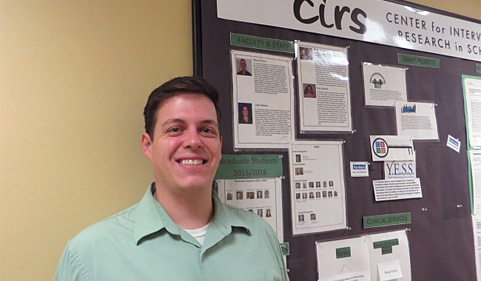By Juliana Scheiderer ’16
Thirty to fifty percent of schoolteachers leave the profession within their first five years—many citing difficulty managing classroom behavior.
Alex Holdaway, sixth-year Psychology doctoral student, and his team at the Center for Intervention Research in Schools are working to provide education majors with the skills they need to effectively manage their classrooms before they graduate.
“We call ourselves classroom management coaches,” Holdaway says.
Through a partnership with Ohio University’s Patton College of Education, Holdaway has been working with senior education majors during their professional internships to help implement these skills before they enter the profession.
“By building those skills effectively now, we can potentially help them feel less stressed when they get into their first jobs and, hopefully, keep them around longer and produce better teachers,” he says.
Child Psychology and Teacher Training
Holdaway says he always knew the field of child psychology was for him.
“I enjoy talking to different people about their issues and problems, and I’ve always liked kids,” he said. “I was a camp counselor and did a lot of that sort of work in high school, and it seemed like a good fit.”
As an undergraduate at the University of North Carolina, Holdaway was inspired by the Psychology Department’s faculty. After graduation, his interest in psychology led him to a research assistant position at Duke, where he worked on projects examining the link between ADHD and adults with addictive behavior. He also worked with a teacher training program designed to help teachers better relate to students with behavior problems.
This project prepared Holdaway well for his current position in Ohio University’s Center for Intervention Research in Schools and its teacher training program.
‘We Call Ourselves Classroom Management Coaches’
The training program, known as the Preservice Classroom Management Project, prepares teachers for better classroom management by showing them how to effectively set up their classrooms to prevent disruptions—and by giving the teachers the skills to handle disruption when it occurs.
Holdaway says the best way for teachers to learn these skills is by practicing them in real time with appropriate feedback.
“Just like any other set of skills, to be able to effectively teach, you need to have practiced opportunities in the environment where you’re going to be implementing the skills,” he explains.
The classroom management coaches observe teachers in the classroom and provide immediate feedback. Better classroom-management skills should lead to fewer disruptions, Holdaway says. With fewer disruptions, teachers can maximize the time they have to teach.
Holdaway’s project within the Center for Intervention Research in Schools is a mutually beneficial partnership. According to Holdaway, this is the first time that faculty from both the Psychology Department and the College of Education have researched a project together
Holdaway, for his part, feels grateful that the partnership exists.
“None of this would be possible without that collaboration between the Psychology Department and the College of Education.”
And Teaching in His Own Classroom
When Holdaway isn’t observing new teachers, he’s doing some teaching himself. On campus, he teaches Introduction to Psychology, as well as Child and Adolescent Psychology classes. Although he enjoys getting psychology majors interested in psychology as it relates to children and adolescents, Holdaway says he finds his Intro to Psychology class especially rewarding.
“It’s been really rewarding to teach people who don’t have a background in psychology, but are still pretty engaged,” he said. “When people come into a psychology course, a lot of the time what they think they’re going to get is the stereotypical idea of a psychologist talking to a person laid back on a couch.… I think it’s really important for students to understand the breadth of what psychology can encompass—and that it includes a lot more than just that one-on-one therapy idea.”
Holdaway adds that he thinks students may be surprised by how useful psychological principles can be in everyday life.
“Psychology can be applied to everyone,” he says.




















Comments